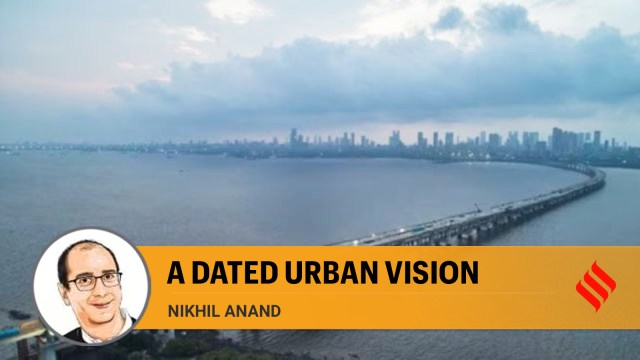
Last week, Prime Minister Narendra Modi inaugurated the Mumbai Trans Harbour Link bridge, the Atal Setu. Completed 60 years after its initial design, the bridge has been advertised as a symbol of the city and the country’s development, its world-class status. This might have been true if the bridge was completed in the 1970s.
But today, urban planners around the world have learned from their mistakes of 50 years and moved on to a different mode of city-making — one that is firmly embedded in urban ecology, and which dissuades car transit. Seen from contemporary developments in urban and transport planning, the new bridge, like the coastal road, will be read not as a world-class development for the future, but as a dated and problematic mode of city-making from times past.
This mode of development not only produces traffic, research has shown, but is also key to the local production of the climate crisis.
Planners in Mumbai, and Indian cities generally, bemoan the slow pace at which city plans are implemented. For instance, at an event hosted by Mumbai CityLabs on January 13, planners complained about the slow and contentious realisation of development plans in the city. I see promise in that failure. It is because city development plans have been so slow to materialise that the city still has available open spaces, wetlands, gardens and playgrounds that perform vital climate mitigation and adaptation services today.
Until recently, the city’s trees absorbed carbon dioxide and provided shade because they weren’t cut down on account of an infrastructure project. Wetlands remain wetlands because developers haven’t been able to execute their developments in the city.
The rapid concretisation and infrastructuring of the city with roads, highways and tunnels in recent years, however, has created several environmental problems.
Planners and engineers alike have simply not accounted for the fact that the city and all its citizens depend on an ecology to live. As they rapidly accelerate infrastructure construction today, the toxic air quality levels of the city, or the increasing extent of rainwater runoff in its streets are evidence of their failures to do so.
Scholars of planning have shown that these failures are not failures of individual planners but of a certain vision and idea of planning that was ascendant in the 1960s. These ideas, however, continue to permeate the work of Mumbai’s planners and its development plans in the 2020s. Rather than rush to complete these outdated intentions of the past — of making bigger concretised roads for example, or paving over all open space like the Mahalaxmi Race Course, this is a good time to reimagine infrastructure planning for the climate-changed city of the present and future. How might planning address and mitigate the air quality crisis its infrastructures have produced?
In what ways are extant open spaces, intertidal regions and mangroves performing critical services the city cannot afford to lose?
Planners and urban planning need to start making our urban futures with the urban social and ecological context of the 21st century and not with the dated plans of the past. It is not too late to do so in Mumbai. And for that, we have to thank the historically slow pace of infrastructure construction in the city.
The writer is the Daniel Braun Silvers and Robert Peter Silvers Family Presidential Professor of Anthropology and Associate Faculty Director at the Center for the
Advanced Study of India at the University of Pennsylvania